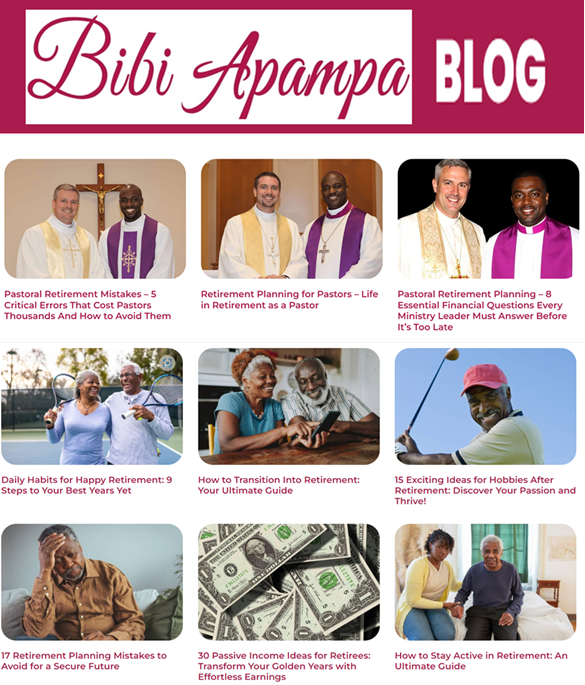10 Keys to Pastoral Retirement Planning : A Complete Guide for Ministers
Pastoral retirement planning presents unique challenges that differ significantly from traditional career paths. Ministers often face lower wages, irregular income streams, and limited employer-sponsored benefits throughout their careers. However, with proper planning and strategic approaches, pastors can build a secure financial foundation for their retirement years.
Understanding the Pastoral Retirement Challenge
Many pastors reach retirement age with insufficient savings due to decades of modest salaries and focus on serving others rather than building personal wealth. The reality is that Social Security benefits alone rarely provide adequate income for comfortable retirement living. This comprehensive guide outlines ten essential strategies specifically designed for ministers preparing for retirement.
1. Start Early with Tax-Advantaged Retirement Accounts
The Power of Compound Interest for Ministers
Time is your greatest asset in retirement planning. Even with modest contributions, starting early allows compound interest to work in your favor. Pastors should prioritize opening and consistently contributing to tax-advantaged retirement accounts as soon as possible in their ministry careers.
Retirement Account Options for Pastors:
- Traditional and Roth IRAs
- 403(b) plans through denominational organizations
- SEP-IRAs for pastors with additional income sources
- Solo 401(k) plans for self-employed ministers
The earlier you begin contributing, the less you'll need to save monthly to reach your retirement goals. A pastor who starts saving at age 25 versus age 45 can accumulate significantly more wealth with smaller monthly contributions.
2. Navigate the Dual Tax Status Advantage
Understanding Your Unique Tax Position
Pastors hold a unique dual tax status that can provide significant advantages in retirement planning when properly understood and utilized. For Social Security and Medicare purposes, pastoral income is considered self-employment income, while for federal income tax purposes, it's treated as employee income.
Strategic Tax Planning Benefits:
- Ability to opt out of Social Security (though rarely recommended)
- Potential for higher retirement account contribution limits
- Strategic timing of income recognition
- Housing allowance benefits that extend into retirement planning
Working with a tax professional familiar with clergy tax law can help maximize these advantages while ensuring compliance with complex regulations.
3. Maximize Housing Allowance Benefits
Leveraging Housing Allowance for Retirement
The ministerial housing allowance is one of the most significant tax benefits available to pastors. This benefit can be strategically used not only during active ministry but also in retirement planning.
Housing Allowance Strategies:
- Designate maximum allowable housing allowance to reduce taxable income
- Use tax savings to increase retirement contributions
- Consider home ownership to build equity for retirement
- Plan for post-retirement housing allowance eligibility
Remember that housing allowance benefits can continue in retirement if you remain ordained and perform ministerial duties, even on a limited basis.
4. Build Multiple Income Streams
Diversifying Income Sources for Financial Security
Relying solely on church salary creates financial vulnerability. Successful pastoral retirement planning involves developing multiple income streams that can provide financial stability both during ministry and in retirement.
Potential Income Sources for Pastors:
- Speaking engagements and conference presentations
- Writing books, articles, or devotional materials
- Consulting services for churches and ministries
- Teaching at Bible colleges or seminaries
- Chaplaincy services
- Online course creation and ministry coaching
These additional income sources not only provide immediate financial benefits but can often continue into retirement, creating ongoing revenue streams.
5. Invest in Your Ministry Home
Real Estate as a Retirement Strategy
For pastors living in church-provided housing, purchasing a personal residence should be a priority in retirement planning. Real estate can serve as both a forced savings mechanism and a hedge against inflation.
Home Ownership Benefits:
- Building equity instead of paying rent
- Potential appreciation in property value
- Tax benefits through mortgage interest deduction
- Stability and security in retirement
- Option to downsize or relocate in retirement
Even if living in a parsonage, consider purchasing rental property as an investment vehicle that can provide passive income in retirement.
6. Plan for Healthcare Costs
Addressing Healthcare in Retirement
Healthcare costs represent one of the largest expenses in retirement, and pastors must plan strategically to ensure adequate coverage and funding for medical needs.
Healthcare Planning Strategies:
- Understand your denomination's retiree health benefits
- Consider Health Savings Accounts (HSAs) if eligible
- Plan for Medicare supplemental insurance
- Budget for long-term care insurance
- Maintain health to reduce future medical costs
Healthcare planning should begin early in your career, as costs continue to rise and coverage options may become more limited as you age.
7. Understand Denominational Benefits
Maximizing Church Pension Plans
Many denominations offer pension plans and retirement benefits that can form the foundation of pastoral retirement planning. Understanding these benefits and maximizing their value is crucial for long-term financial security.
Key Denominational Benefits:
- Defined benefit pension plans
- Defined contribution plans
- Supplemental retirement savings programs
- Life insurance benefits
- Continuing education allowances
- Retiree healthcare benefits
Contact your denominational benefits office to understand exactly what benefits you're eligible for and how to maximize their value throughout your career.
8. Develop Financial Literacy
Building Money Management Skills
Many pastors receive limited training in personal finance during seminary education. Developing financial literacy is essential for making informed decisions about retirement planning, investments, and money management.
Financial Education Areas:
- Basic investment principles and portfolio management
- Understanding risk tolerance and asset allocation
- Insurance needs analysis
- Estate planning basics
- Tax planning strategies
- Debt management and elimination
Consider taking financial planning courses, reading reputable financial books, or working with a financial advisor who understands clergy-specific financial situations.
9. Create a Comprehensive Estate Plan
Protecting Your Legacy and Loved Ones
Estate planning ensures that your assets are distributed according to your wishes while minimizing taxes and legal complications for your beneficiaries.
Essential Estate Planning Documents:
- Will and testament
- Durable power of attorney
- Healthcare directives
- Beneficiary designations on retirement accounts
- Trust structures if appropriate
- Life insurance planning
Regular review and updates of estate planning documents ensure they remain current with your changing circumstances and wishes.
10. Seek Professional Guidance
Working with Qualified Advisors
Given the complexity of pastoral finances and retirement planning, working with qualified professionals can provide valuable guidance and peace of mind.
Professional Team Members:
- Fee-only financial planners familiar with clergy finances
- CPAs experienced with ministerial tax issues
- Estate planning attorneys
- Insurance professionals
- Investment advisors
Look for professionals who understand the unique aspects of pastoral compensation and can provide advice tailored to your specific situation.
Creating Your Pastoral Retirement Action Plan
Steps to Begin Today
Successful retirement planning requires action, not just intention. Begin implementing these strategies immediately, regardless of your current age or career stage.
Immediate Action Items:
- Calculate your current retirement savings rate
- Open or increase contributions to retirement accounts
- Review and optimize your housing allowance designation
- Assess your current insurance coverage
- Schedule a meeting with your denominational benefits office
- Begin developing additional income streams
- Create or update your estate planning documents
Common Pastoral Retirement Planning Mistakes
Avoiding Financial Pitfalls
Learning from common mistakes can help you avoid costly errors in your retirement planning journey.
Mistakes to Avoid:
- Procrastinating on retirement savings
- Ignoring the dual tax status benefits
- Failing to plan for healthcare costs
- Not understanding denominational benefits
- Avoiding investment market participation
- Neglecting estate planning
- Not seeking professional guidance
The Path Forward
Pastoral retirement planning requires intentional effort and strategic thinking, but the rewards of financial security in your golden years are worth the investment. By implementing these ten keys to pastoral retirement planning, you can build a solid financial foundation that allows you to retire with dignity and continue serving others without financial stress.
Remember that retirement planning is a marathon, not a sprint. Consistent, steady progress over time will yield the best results. Start where you are, use what you have, and take action today to secure your financial future.
The calling to ministry doesn't have to mean accepting financial insecurity in retirement. With proper planning, wise decisions, and consistent action, pastors can achieve financial independence and enjoy a comfortable retirement while maintaining their commitment to serving God and others throughout their lives.
About the Author
Bibi Apampa, "The Retirement Queen," specializes in building retirement wealth and financial planning for ministers and church leaders. With over 20 years of experience helping pastors create financially secure retirements, Bibi understands the unique challenges facing those in ministry. Through her work at RetirementPlanningForPastors.org, she has guided hundreds of pastors through effective retirement planning and secure transitions. For customized retirement planning assistance specifically for pastors and clergymen, visit www.RetirementPlanningForPastors.org today.

